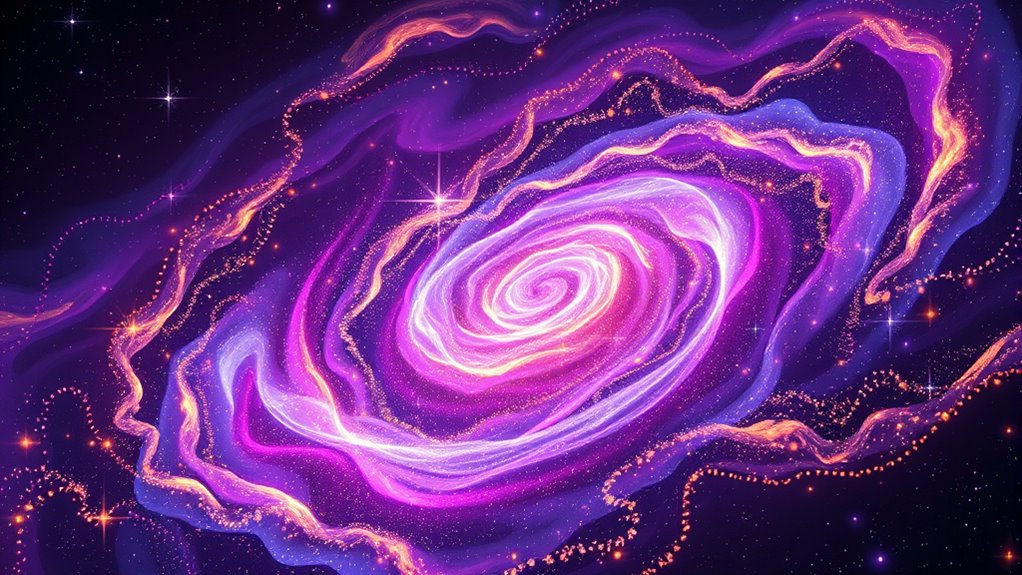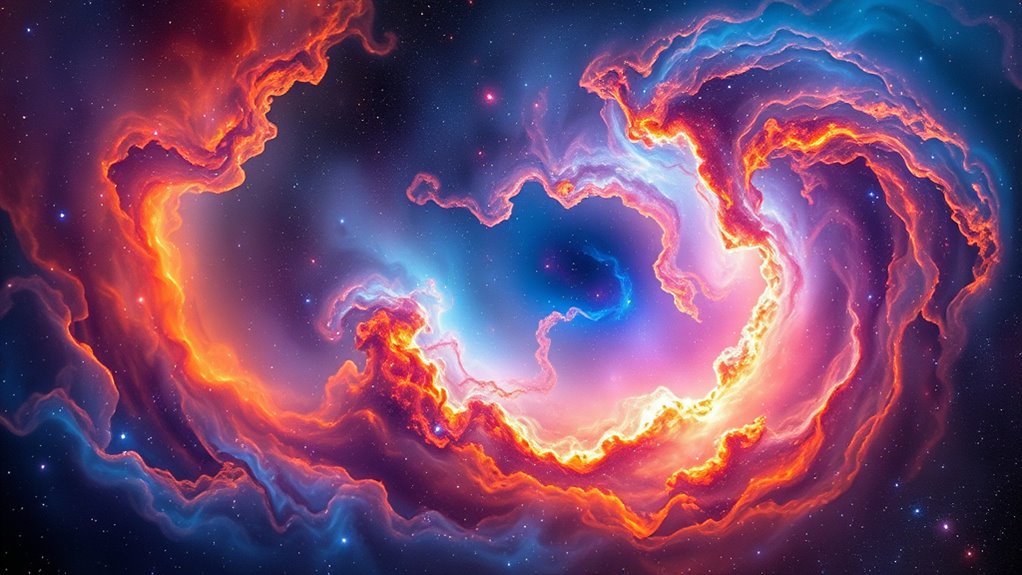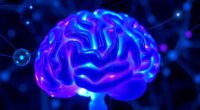Quantum randomness suggests that the universe’s behavior is truly unpredictable at its core, not just due to complexity or lack of knowledge. In quantum systems, outcomes happen probabilistically, governed by inherent indeterminacy. When particles become entangled, measuring one instantly influences the other, emphasizing the fundamental unpredictability. If you can understand how this deepens our view of reality, explore further to uncover the complexities behind quantum indeterminacy and its implications.
Key Takeaways
- Quantum outcomes are inherently probabilistic, meaning some events cannot be predicted with certainty, suggesting true unpredictability at fundamental levels.
- Entanglement links particles so that measurement results are correlated in ways that defy classical predictability, reinforcing quantum randomness.
- The wave function collapse during measurement introduces genuine indeterminacy, implying the universe’s behavior at quantum scale may be fundamentally unpredictable.
- Debates over hidden variables question whether apparent randomness is due to incomplete knowledge or is truly intrinsic to nature.
- The probabilistic nature of quantum mechanics indicates that, at its core, the universe may indeed be inherently unpredictable.

Have you ever wondered what makes certain events truly unpredictable? In the domain of quantum physics, unpredictability isn’t just a matter of chaos or complexity; it’s woven into the very fabric of reality. At the heart of this lies the concept of quantum randomness, which suggests that some outcomes are fundamentally indeterminate. Unlike classical systems where unpredictability results from lack of information, quantum events are inherently probabilistic. This means that, even with complete knowledge of a system, you can’t predict specific results with certainty. Instead, you only know the likelihood of various outcomes.
Quantum unpredictability is built into reality; outcomes are fundamentally probabilistic, not just due to lack of information.
One key idea behind quantum randomness involves quantum entanglement. Imagine two particles linked so tightly that measuring one instantly affects the state of the other, no matter how far apart they are. This phenomenon defies everyday intuition and challenges notions of local realism. When you perform a measurement on one entangled particle, you instantly influence its partner’s state, revealing a kind of non-local connection. This entanglement plays a vital role in creating unpredictability because, until you measure, the particles exist in a superposition of states. Only upon measurement does the wave function collapse, producing a definite outcome. This collapse isn’t just a technical detail; it embodies the essence of quantum randomness, where outcomes are genuinely probabilistic rather than predetermined.
However, the measurement problem complicates the picture. It questions how and why the wave function collapses when observed, leading to debates about whether quantum mechanics is complete or if some deeper hidden variables influence outcomes. If the wave function collapse is truly random, then quantum randomness is fundamental. But if some hidden factors govern the process, then the universe might be deterministic at a deeper level, with apparent randomness emerging from our limited understanding. This dilemma is central to understanding whether the universe is truly unpredictable or if what seems random is just a reflection of incomplete knowledge.
In your exploration of quantum randomness, you’re delving into the core philosophical and scientific questions about the nature of reality. Is the universe inherently unpredictable, or does it operate according to hidden rules we haven’t uncovered yet? The interplay between quantum entanglement and the measurement problem shows that, at the smallest scales, unpredictability is baked into the universe. Whether this randomness is truly fundamental or a sign of our ignorance remains one of the most profound questions in physics, prompting you to rethink what it means for something to be genuinely unpredictable. Additionally, the concept of probabilistic nature in quantum mechanics underscores that outcomes are governed by probabilities rather than certainties, fundamentally changing our understanding of causality in the universe.
Frequently Asked Questions
How Does Quantum Randomness Compare to Classical Randomness?
When comparing quantum randomness to classical probability, you find that classical randomness often stems from deterministic chaos, where complex systems appear unpredictable but follow underlying rules. Quantum randomness, however, is inherently unpredictable at the fundamental level, not just due to complexity. You can’t determine outcomes even with complete knowledge, making quantum unpredictability fundamentally different from classical probability, which relies on incomplete information rather than true randomness.
Can Quantum Randomness Be Harnessed for Secure Communication?
Imagine a world where your secrets stay safe, thanks to quantum cryptography. You can harness quantum randomness for secure communication because it provides truly unpredictable randomness generation. This makes eavesdropping nearly impossible, giving you peace of mind. Quantum cryptography uses the inherent unpredictability of quantum particles, so your messages remain private. It’s like having a secret code that can’t be cracked, ensuring your information stays protected in an elegant, cutting-edge way.
Is Unpredictability in Quantum Mechanics Absolute or Just Practical?
You wonder if quantum unpredictability is truly absolute or just practical. While many think it’s fundamental, some argue that hidden variables might explain apparent randomness, making the universe deterministic at a deeper level. However, experiments on deterministic chaos suggest that even if hidden variables exist, they don’t make quantum outcomes predictable. So, for now, you can think of quantum unpredictability as genuinely fundamental, not just a practical limitation.
What Are the Implications of Quantum Randomness for Free Will?
You might wonder how quantum randomness impacts the determinism debate and your moral responsibility. If your choices are influenced by unpredictable quantum events, it suggests free will could have a foundation beyond strict causality. This challenges the idea that everything is predetermined, potentially allowing you to be morally responsible for your actions. Quantum randomness adds complexity to understanding free will, but it doesn’t definitively resolve whether you’re truly autonomous.
Could Future Discoveries Challenge Our Understanding of Quantum Unpredictability?
You might find it surprising that over 90% of physicists believe quantum events are fundamentally unpredictable. Future discoveries could challenge current ideas, especially regarding deterministic models or hidden variables. If we uncover new principles, our understanding of quantum unpredictability could shift, revealing underlying causes we haven’t yet seen. This could mean that what seems random now might someday be explained, altering our view of the universe’s true nature.
Conclusion
So, here you are, pondering whether the universe is truly unpredictable or just playing tricks on us. Ironically, even with all our advanced science, we can’t fully tame or predict the chaos of quantum randomness. It’s like trying to hold onto a flickering flame—fascinating, elusive, and endlessly surprising. Maybe the universe’s greatest secret is that its unpredictability keeps us curious, proving that sometimes, the most profound truths are the ones we’ll never fully grasp.









